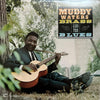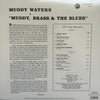



Muddy Waters – Muddy, Brass & The Blues
Muddy Waters – vocals, guitar [click here to see more vinyl featuring Muddy Waters]
Otis Spann – piano [click here to see more vinyl featuring Otis Spann]
James Cotton – harmonica
James ‘Pee Wee’ Madison, Sam Lawhorn – guitar
Calvin Jones – bass
Willie Smith – drums
Gene Barge – tenor saxophone
Written by Bob Miller (A1), Pete Johnson (A2), Big Joe Turner (A2), Jessie Mae Robinson (A3), Richard M. Jones (A4), Will Shade (A5), Chuck Willis (B1), Robert Nighthawk (B2), Jesse Anderson (B3), Gene Barge (B3), McKinley Morganfield (B5)
B4 is a traditional song arranged by Charles Stepney, Gene Barge, Ralph Bass
1 LP, standard sleeve
Original analog Master tape : YES
Heavy Press : 180g
Record color : Black
Speed : 33RPM
Size : 12'’
Stereo
Studio
Record Press : Memphis Record Pressing
Label : Elemental Music
Original Label : Chess
Recorded in June 22 and 23 1966, at Ter Mar Recording Studio, Chicago, Illinois
Original sessions produced by Gene Barge, Ralph Bass
Reissue produced by Jordi Soley
Mastered at GZ Media
Liner Notes by Ralph Bass
Originally released in 1966
Reissued in July 2023
Tracks :
Side A:
- Corine, Corina
- Piney Brown Blues
- Black Night
- Trouble in Mind
- Going Back to Memphis
Side B:
- Betty and Dupree
- Sweet Little Angel
- Take My Advice
- Trouble
- Hard Loser
Reviews :
“This is a strange -- though in large part, successful -- album on a number of counts. Appearing after the release of the singles compilation Real Folk Blues, Brass and the Blues (also sometimes known as Muddy, Brass, and the Blues) was Chess Records' effort to give some fresh momentum to Muddy Waters' current recordings. It was only his third original LP following his tribute album to Big Bill Broonzy and the Folk Singer album -- like them, it was a concept album, but with a difference. Those earlier albums had been built around Waters simply returning to sounds and influences out of his past, but for Brass and the Blues the label tried to give him a new sound, somewhere close to that of B.B. King (who was selling a lot of records at the time). The presence of the brass and the prominent organ on some songs was manageable. Stripped of his guitar once again (the cover photo notwithstanding), Waters proved what a great R&B singer he was -- there are moments on this album where he almost crosses over into Otis Redding territory. Sammy Lawhorn and Pee Wee Madison's guitars come through the dubbed-on brass reasonably well, and this is more of a real "band" sound than was achieved on, say, Electric Mud, an even more extreme attempt at reshaping Waters' sound. The album was reasonably successful, though the reality in terms of Waters's sound and history is that, when this material has been compiled, the producers have often tried to use the undubbed versions without the brass.” AllMusic Review by Bruce Eder
Rating:
AllMusic: 2.5 / 5 ; Discogs : 4.5 / 5


